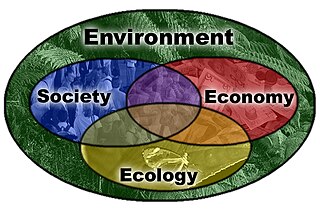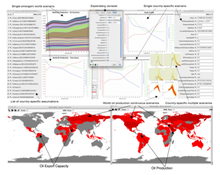Social simulation is a research field that applies computational methods to study issues in the social sciences. The issues explored include problems in computational law, psychology, organizational behavior, sociology, political science, economics, anthropology, geography, engineering, archaeology and linguistics.
Experimental economics is the application of experimental methods to study economic questions. Data collected in experiments are used to estimate effect size, test the validity of economic theories, and illuminate market mechanisms. Economic experiments usually use cash to motivate subjects, in order to mimic real-world incentives. Experiments are used to help understand how and why markets and other exchange systems function as they do. Experimental economics have also expanded to understand institutions and the law.
System of systems is a collection of task-oriented or dedicated systems that pool their resources and capabilities together to create a new, more complex system which offers more functionality and performance than simply the sum of the constituent systems. Currently, systems of systems is a critical research discipline for which frames of reference, thought processes, quantitative analysis, tools, and design methods are incomplete. The methodology for defining, abstracting, modeling, and analyzing system of systems problems is typically referred to as system of systems engineering.
A macroeconomic model is an analytical tool designed to describe the operation of the problems of economy of a country or a region. These models are usually designed to examine the comparative statics and dynamics of aggregate quantities such as the total amount of goods and services produced, total income earned, the level of employment of productive resources, and the level of prices.

A multi-agent system is a computerized system composed of multiple interacting intelligent agents. Multi-agent systems can solve problems that are difficult or impossible for an individual agent or a monolithic system to solve. Intelligence may include methodic, functional, procedural approaches, algorithmic search or reinforcement learning.
An agent-based model (ABM) is a computational model for simulating the actions and interactions of autonomous agents in order to understand the behavior of a system and what governs its outcomes. It combines elements of game theory, complex systems, emergence, computational sociology, multi-agent systems, and evolutionary programming. Monte Carlo methods are used to understand the stochasticity of these models. Particularly within ecology, ABMs are also called individual-based models (IBMs). A review of recent literature on individual-based models, agent-based models, and multiagent systems shows that ABMs are used in many scientific domains including biology, ecology and social science. Agent-based modeling is related to, but distinct from, the concept of multi-agent systems or multi-agent simulation in that the goal of ABM is to search for explanatory insight into the collective behavior of agents obeying simple rules, typically in natural systems, rather than in designing agents or solving specific practical or engineering problems.
Computational economics is an interdisciplinary research discipline that combines methods in computational science and economics to solve complex economic problems. This subject encompasses computational modeling of economic systems. Some of these areas are unique, while others established areas of economics by allowing robust data analytics and solutions of problems that would be arduous to research without computers and associated numerical methods.

The Biocomplexity Institute of Virginia Tech was a research institute specializing in bioinformatics, computational biology, and systems biology. The institute had more than 250 personnel, including over 50 tenured and research faculty. Research at the institute involved collaboration in diverse disciplines such as mathematics, computer science, biology, plant pathology, biochemistry, systems biology, statistics, economics, synthetic biology and medicine. The institute developed -omic and bioinformatic tools and databases that can be applied to the study of human, animal and plant diseases as well as the discovery of new vaccine, drug and diagnostic targets.
Neuroinformatics is the emergent field that combines informatics and neuroscience. Neuroinformatics is related with neuroscience data and information processing by artificial neural networks. There are three main directions where neuroinformatics has to be applied:

Computational Engineering is an emerging discipline that deals with the development and application of computational models for engineering, known as Computational Engineering Models or CEM. Computational engineering uses computers to solve engineering design problems important to a variety of industries. At this time, various different approaches are summarized under the term Computational Engineering, including using computational geometry and virtual design for engineering tasks, often coupled with a simulation-driven approach In Computational Engineering, algorithms solve mathematical and logical models that describe engineering challenges, sometimes coupled with some aspect of AI, specifically Reinforcement Learning.
Agent-based computational economics (ACE) is the area of computational economics that studies economic processes, including whole economies, as dynamic systems of interacting agents. As such, it falls in the paradigm of complex adaptive systems. In corresponding agent-based models, the "agents" are "computational objects modeled as interacting according to rules" over space and time, not real people. The rules are formulated to model behavior and social interactions based on incentives and information. Such rules could also be the result of optimization, realized through use of AI methods.

AnyLogic is a multimethod simulation modeling tool developed by The AnyLogic Company. It supports agent-based, discrete event, and system dynamics simulation methodologies. AnyLogic is cross-platform simulation software that works on Windows, macOS and Linux. AnyLogic is used to simulate: markets and competition, healthcare, manufacturing, supply chains and logistics, retail, business processes, social and ecosystem dynamics, defense, project and asset management, pedestrian dynamics and road traffic, IT, and aerospace. It is considered to be among the major players in the simulation industry, especially within the domain of business processes is acknowledged to be a powerful tool.

Computational sustainability is an emerging field that attempts to balance societal, economic, and environmental resources for the future well-being of humanity using methods from mathematics, computer science, and information science fields. Sustainability in this context refers to the world's ability to sustain biological, social, and environmental systems in the long term. Using the power of computers to process large quantities of information, decision making algorithms allocate resources based on real-time information. Applications advanced by this field are widespread across various areas. For example, artificial intelligence and machine learning techniques are created to promote long-term biodiversity conservation and species protection. Smart grids implement renewable resources and storage capabilities to control the production and expenditure of energy. Intelligent transportation system technologies can analyze road conditions and relay information to drivers so they can make smarter, more environmentally-beneficial decisions based on real-time traffic information.
Robust decision-making (RDM) is an iterative decision analytics framework that aims to help identify potential robust strategies, characterize the vulnerabilities of such strategies, and evaluate the tradeoffs among them. RDM focuses on informing decisions under conditions of what is called "deep uncertainty", that is, conditions where the parties to a decision do not know or do not agree on the system models relating actions to consequences or the prior probability distributions for the key input parameters to those models.
Prospective Outlook on Long-term Energy Systems (POLES) is a world simulation model for the energy sector that runs on the Vensim software. It is a techno-economic model with endogenous projection of energy prices, a complete accounting of energy demand and supply of numerous energy vectors and associated technologies, and a carbon dioxide and other greenhouse gases emissions module.
Integrated computational materials engineering (ICME) involves the integration of experimental results, design models, simulations, and other computational data related to a variety of materials used in multiscale engineering and design. Central to the achievement of ICME goals has been the creation of a cyberinfrastructure, a Web-based, collaborative platform which provides the ability to accumulate, organize and disseminate knowledge pertaining to materials science and engineering to facilitate this information being broadly utilized, enhanced, and expanded.
Integrated asset modelling (IAM) is the generic term used in the oil industry for computer modelling of both the subsurface and the surface elements of a field development. Historically the reservoir has always been modelled separately from the surface network and the facilities. In order to capture the interaction between those two or more standalone models, several time-consuming iterations were required. For example, a change in the water breakthrough leads to a change in the deliverability of the surface network which in turn leads to a production acceleration or deceleration in the reservoir. In order to go through this lengthy process more quickly, the industry has slowly been adopting a more integrated approach which captures the constraints imposed by the infrastructure on the network immediately.
Open energy system models are energy system models that are open source. However, some of them may use third party proprietary software as part of their workflows to input, process, or output data. Preferably, these models use open data, which facilitates open science.
Energy modeling or energy system modeling is the process of building computer models of energy systems in order to analyze them. Such models often employ scenario analysis to investigate different assumptions about the technical and economic conditions at play. Outputs may include the system feasibility, greenhouse gas emissions, cumulative financial costs, natural resource use, and energy efficiency of the system under investigation. A wide range of techniques are employed, ranging from broadly economic to broadly engineering. Mathematical optimization is often used to determine the least-cost in some sense. Models can be international, regional, national, municipal, or stand-alone in scope. Governments maintain national energy models for energy policy development.





